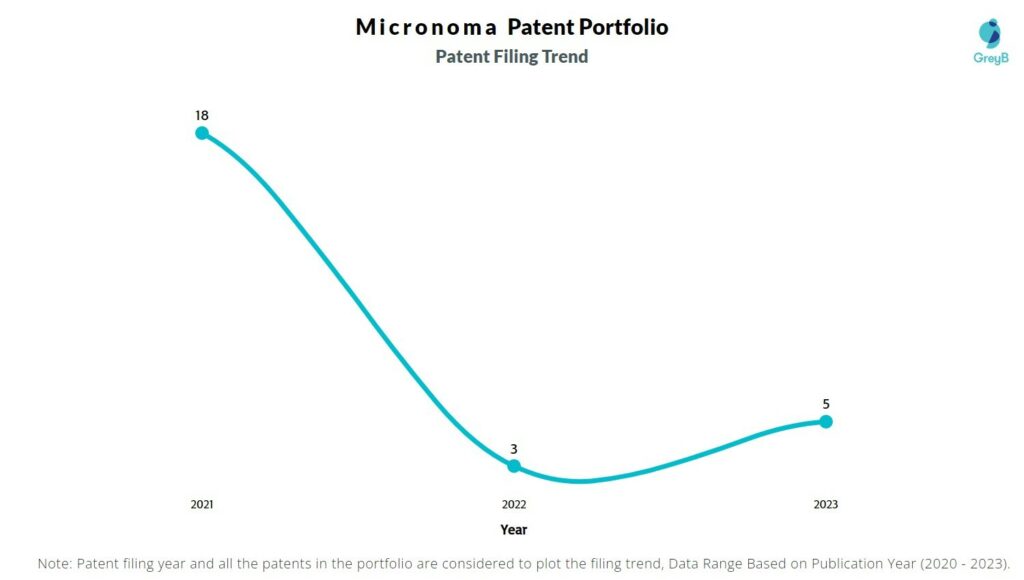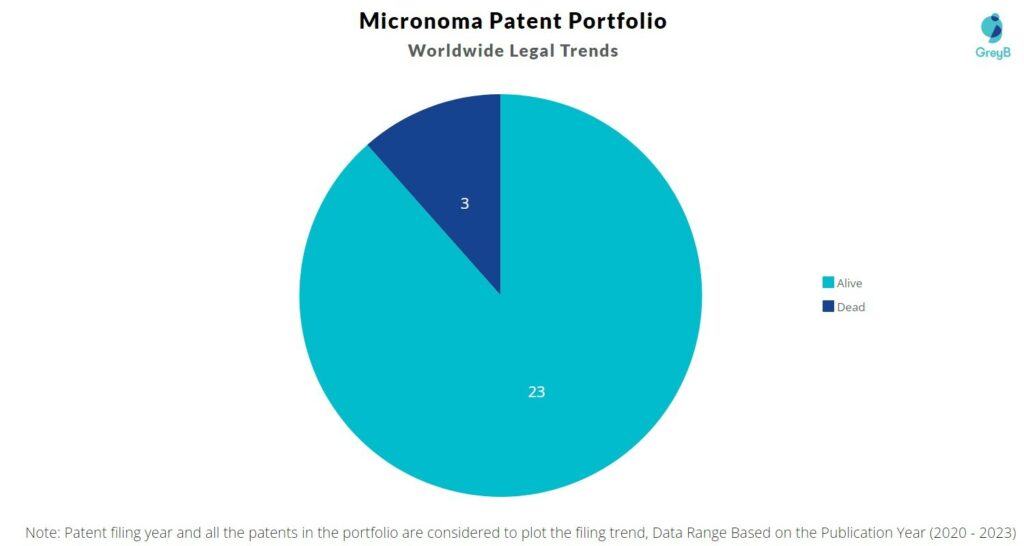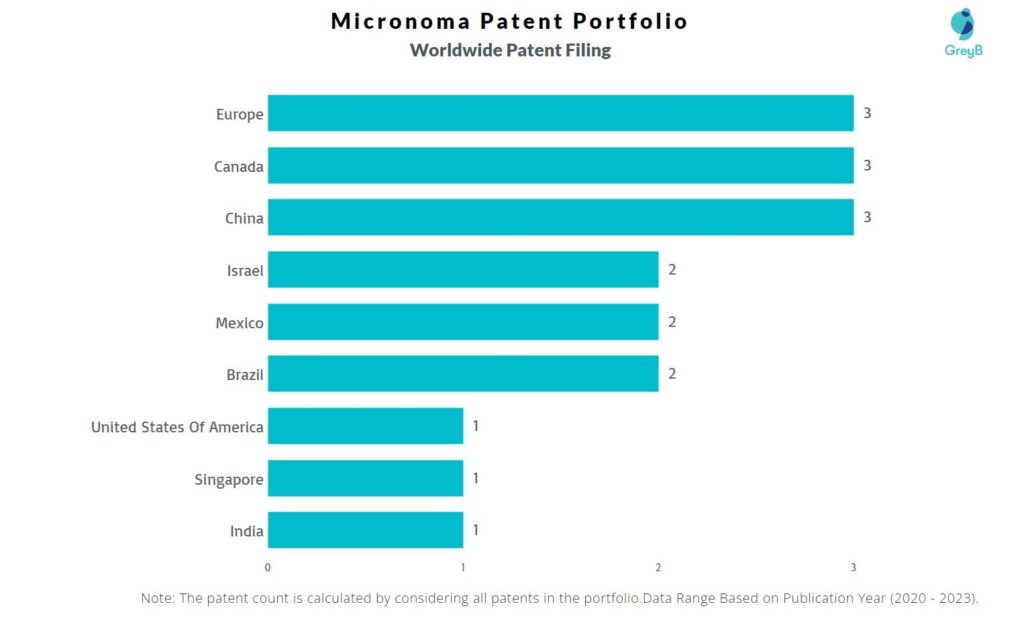Micronoma has a total of 26 patents globally, out of which no patent have been granted. Of these 26 patents, more than 88% patents are active. Europe, Canada and Japan is where Micronoma has filed the maximum number of patents. Parallelly, United States of America seems to be the main focused R&D centre and also is the origin country of Micronoma.
Micronoma was founded in 2019. Micronoma is a company that’s use liquid biopsy technology for detecting and predicting cancer early on. They do this by examining microbial signals with high accuracy, helping identify cancer at its initial stages.
Do read about some of the most popular patents of Micronoma which have been covered by us in this article and also you can find Micronoma patents information, the worldwide patent filing activity and its patent filing trend over the years, and many other stats over Micronoma patent portfolio.
How many patents does Micronoma have?
Micronoma has a total of 26 patents globally. These patents belong to 8 unique patent families. Out of 26 patents, 23 patents are active.
How Many Patents did Micronoma File Every Year?

Are you wondering why there is a drop in patent filing for the last two years? It is because a patent application can take up to 18 months to get published. Certainly, it doesn’t suggest a decrease in the patent filing.
| Year of Patents Filing or Grant | Micronoma Applications Filed | Micronoma Patents Granted |
| 2023 | 5 | – |
| 2022 | 3 | – |
| 2021 | 18 | – |
How many Micronoma patents are Alive/Dead?
Worldwide Patents

How Many Patents did Micronoma File in Different Countries?

Countries in which Micronoma Filed Patents
| Country | Patent |
| Europe | 3 |
| Canada | 3 |
| China | 3 |
| Israel | 2 |
| Mexico | 2 |
| Brazil | 2 |
| United States Of America | 1 |
| Singapore | 1 |
| India | 1 |
Where are Research Centers of Micronoma Patents Located?
The Research Centers of Micronoma Patents is the United States of America.
List of Micronoma patents
| Micronoma Patents | Title |
| US20230420134A1 | Cancer Diagnosis And Classification By Non-Human Metagenomic Pathway Analysis |
| EP4268232A1 | Taxonomy-Independent Cancer Diagnostics And Classification Using Microbial Nucleic Acids And Somatic Mutations |
| EP4244374A1 | Cancer Diagnosis And Classification By Non-Human Metagenomic Pathway Analysis |
| EP4244856A1 | Systems And Methods To Improve Therapeutic Outcomes |
| CN117203705A | Taxonomy-Independent Cancer Diagnosis And Classification Using Microbial Nucleic Acids And Somatic Mutations |
| CN117083679A | Systems And Methods For Improving Treatment Outcomes |
| CN116917495A | Cancer Diagnosis And Classification By Non-Human Metagenome Pathway Analysis |
| WO2023173034A3 | Disease Classifiers From Targeted Microbial Amplicon Sequencing |
| WO2023215765A1 | Systems And Methods For Enriching Cell-Free Microbial Nucleic Acid Molecules |
| WO2023059922A3 | Metaepigenomics-Based Disease Diagnostics |
| WO2023034618A1 | Methods Of Identifying Cancer-Associated Microbial Biomarkers |
| WO2023003917A1 | Methods Of Disease Diagnostics Utilizing Microbial Extracellular Vesicle (Mev) Analytes |
| CA3202888A1 | Taxonomy-Independent Cancer Diagnostics And Classification Using Microbial Nucleic Acids And Somatic Mutations |
| CA3199032A1 | Cancer Diagnosis And Classification By Non-Human Metagenomic Pathway Analysis |
| CA3198341A1 | Systems And Methods To Improve Therapeutic Outcomes |
| MX2023007515A | Diagnosis And Classification Of Cancer Independent Of Taxonomy Using Microbial Nucleic Acids And Somatic Mutations |
| BR112023012453A2 | Taxonomy And Classification-Independent Cancer Diagnosis Using Microbial Nucleic Acids And Somatic Mutations |
| BR112023009406A2 | Cancer Diagnosis And Classification By Non-Human Metagenomic Pathway Analysis |
| MX2023005749A | Diagnosis And Classification Of Cancer Through The Analysis Of Non-Human Metagenomic Pathways |
| IL303849A | Taxonomy-Independent Cancer Diagnostics And Classification Using Microbial Nucleic Acids And Somatic Mutations |
| IL302908A | Cancer Diagnosis And Classification By Non-Human Metagenomic Pathway Analysis |
| IN202317048446A | Taxonomy-Independent Cancer Diagnostics And Classification Using Microbial Nucleic Acids And Somatic Mutations |
| SG11202304861TA | Taxonomy-Independent Cancer Diagnostics And Classification Using Microbial Nucleic Acids And Somatic Mutations |
| WO2022140616A1 | Taxonomy-Independent Cancer Diagnostics And Classification Using Microbial Nucleic Acids And Somatic Mutations |
| WO2022103975A1 | Systems And Methods To Improve Therapeutic Outcomes |
| WO2022104278A1 | Cancer Diagnosis And Classification By Non-Human Metagenomic Pathway Analysis |
What are Micronoma key innovation segments?
What Technologies are Covered by Micronoma?

The chart below distributes patents filed by Micronoma
